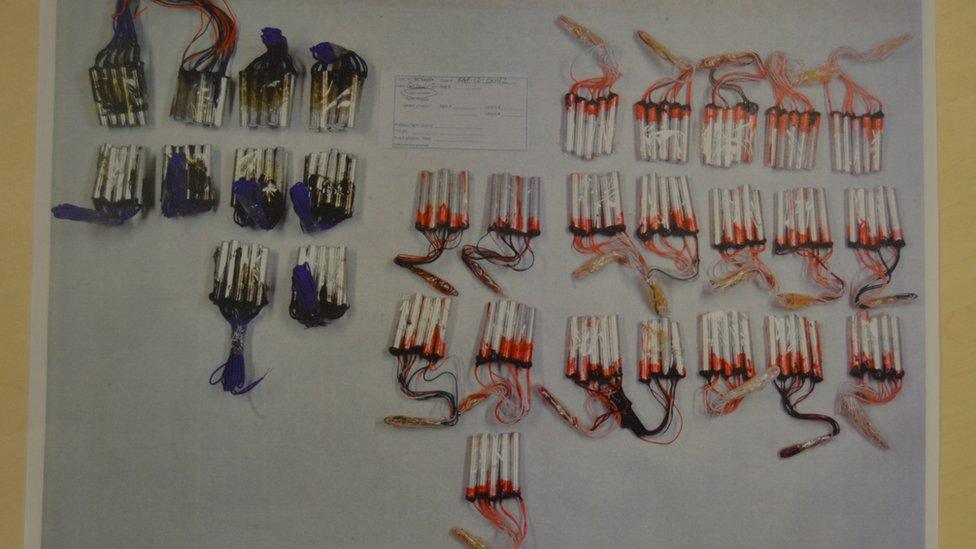Khalid Ali: British Taliban bomber guilty of Westminster plot
- Published
How police tracked and caught plumber-turned-bomb maker Khalid Ali
A British plumber has been convicted of planning a terror attack in Westminster and making bombs for the Taliban.
Khalid Ali, 28, was arrested on 27 April 2017 in Parliament Street, where he was caught carrying three knives.
Prosecutors said Ali, from Edmonton in north London, had planned a "murderous attack" on politicians and police.
In a police interview, Ali said he wanted to deliver a "message" to British authorities, but claimed the knives were for protection.
An Old Bailey jury convicted him of preparing an act of terrorism in the UK and two counts of possessing an explosive substance with intent. He did not react as the verdicts were read out.
Ali will be sentenced on 20 July.
On 22 April last year - one month after the Westminster terror attack - Ali was caught on CCTV walking past the MI6 building at Vauxhall Cross, as well as Westminster Bridge, the Houses of Parliament and Whitehall.
Five days later, his mother called police and said she had found four knives in his bedroom.
Police swooped in to arrest him just metres from Downing Street later that day.
Ali had spent several years in Afghanistan, and when asked by British police whether he had returned to the UK for jihad, he replied: "Jihad is what we do. We are Mujahideen."
Deputy Assistant Commissioner Dean Haydon described Ali as an "incredibly dangerous individual".
Prosecutor Brian Altman QC had told the jury that Ali planned a "deadly terror attack at the very heart of this country's democracy by killing a police officer, a member of the military or even a parliamentarian".
DNA samples
Ali travelled to Afghanistan in 2011 and spent five years making bombs to maim and kill coalition troops.
In late October 2016, he appeared at the British consulate in Istanbul, Turkey, claiming to have lost his passport and asking for a temporary travel document in order to get home.
He returned to the UK in early November 2016, when he was stopped at Heathrow airport, interviewed by police and had his fingerprints and DNA samples taken.
The DNA samples and fingerprints were then shared with the FBI, which controls a database containing fingerprints found on bomb parts in global conflict zones.
FBI agents found 42 prints linking Ali to improvised explosive devices (IEDs) in Afghanistan.
Defending the decision not to arrest Ali until April 2017 - when he was armed and within metres of Parliament - Mr Haydon said police and security services were "managing any potential risk he posed and he was arrested at the most appropriate time".

Ali's prints were found on bomb components from two caches recovered by Afghan national security forces
During questioning after his arrest, Ali admitted fighting British soldiers in Afghanistan, but refused to say whether he had killed any.
In a police interview shown during the trial, Ali also said he had detonated more than 300 bombs.
The court heard how his fingerprints were found on component parts of explosive devices that were handed in to US forces in Afghanistan in 2012.
Police said Ali had been in a "Taliban training camp affiliated to al-Qaeda where, for several years, he helped terrorists make hundreds of bombs capable of mass murder".
- Published26 June 2018
